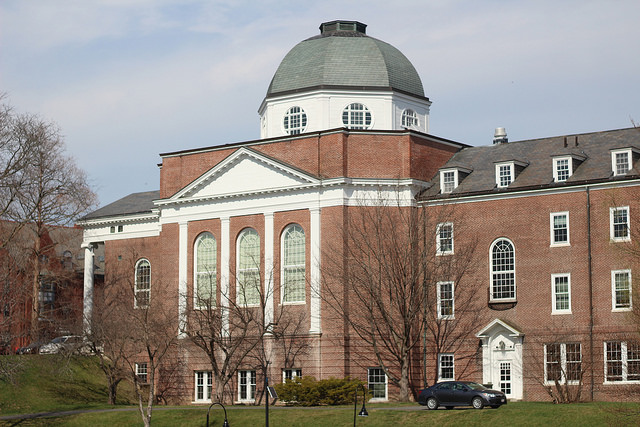Martha Minow, the 300th Anniversary University Professor at Harvard Law School, spoke on the dynamics of media in her lecture as part of the Smith College Presidential Colloquium Series on Monday.
Her lecture, entitled “Freedom of the Press and the Changing Ecosystem of News,” is the first in a long series, running until April 2019, held by Smith College. All of the lectures scheduled will feature prominent thought leaders from many fields to engage and educate the public on key contemporary issues.
In her lecture, Minow emphasized the importance of the role the press plays in holding those in power accountable.
Minow said, “The United States is in danger of losing the crucial relationship between the press and democracy. That relationship that holds people in power accountable. That relationship that was presumed by the authors of the first amendment.”
Before Minow’s speech began, Stacey Schmeidel, Director of Media Relations at Smith, noted how almost all of the speakers lined up in the Colloquium series are women.
Minow’s talk was presented in conjunction with Constitution Day, so the lecture contained many elements of analysis about the Constitution and its interpretation.
After graduating from the University of Michigan, Minow earned a master’s degree from Harvard and a J.D. from Yale Law School. Throughout her career, Minow worked in diverse subject areas, including civil legal work and human rights and education work.
As introduced by Smith College President Kathleen McCartney, “She is known for her extraordinary intellectual range. She speaks and writes on such far ranging topics as ethics, social justice, religion, violence and forgiveness. She is particularly celebrated for her work on human rights…gender, disability and sexual orientation.”
“Democracy matters if you happen to like freedom. If you like participation, if you dislike tyranny,” she added.
Minow began her lecture by analyzing the purpose of the first amendment, saying “The First Amendment of the United States Constitution assumes the existence and, in fact, the vitality of a private industry. It’s kind of remarkable. The only private industry assumed by the Constitution is the press.”
The First Amendment protected traditional forms of journalism, yet it in our modern day, reputable media coverage is increasingly becoming jeopardized, Minow argues.
Explaining the impact of social media news in today’s day and age, Minow says, “The current challenge is… not from government action in a direct way, but from the technologies and the economics of communication systems that alter how news is gathered, reported and received. Technology, business and regulation could significantly change the situation.”
Noting the influence of online algorithms, she furthers that “targeted marketing divides people into subgroups that carves up mass media and, indeed, our communities where people just hear different news.”
Furthering this idea of the peril of news media, Minow brings up the point that, because of this, local news sources are being disrupted.
“Small newspapers, steep declines in readers and revenues. Many have merged or consolidated to chains or private equity investors,” said Minow. “Papers like ‘The Rocky Mountain News’ closed. Others reduced the frequency of their issues. Local news updates shrank and because of the relatively small number of people who are affected in the localities, there isn’t a market to create an internet source of news.”
Minow went on to use the aftermath of the fatal police shooting of Michael Brown to show the importance of media holding public institutions accountable.
“Take for example the excessive reliance on fines and fees by the legal system in Ferguson, Missouri,” Minow continued, “the place where the police shot Michael Brown and then triggered attention all over the country to the behavior of the police, and also the reliance on fines and fees for the poorest people in the country. Ferguson, Missouri, turns out, had no daily newspaper. No local television. No cable TV.”
Throughout the lecture Minow repeatedly stressed that the media is essential for accessing all other rights in our society. Citing the reaction to Stamp Act of 1765, Minow explained how “Freedom of the press indeed came to symbolize liberty to all.”
Minow gives a multitude of plausible solutions to the decline in diverse media coverage. She proposes reviving a Fairness Doctrine, a structural change in the way digital platforms are allowed to spread information and enforcing anti-trust laws.
In her lecture, Minow argued that the government must get involved to maintain diverse media coverage. She said, “There are many, many things the government can do and my point is simply that I think the government has to.”
Citing a quote by Alexander Meiklejohn, a thought leader who believed that the First Amendment was essential for democracy, Minow concluded her lecture by stating, “‘We must accept and applaud the assertion that the Constitution is an experiment in the sense in which all of life is an experiment’. I think it’s liberating not to think about it not just as a dusty old document, but as an experiment. Let’s not let it be an experiment that fails. Just about any right that you care about depends on the viability of the news. Success of the entire Constitutional experiment depends upon the people like you engaging with these issues, being vigilant and breathing a new life and energy into the Constitution and its aspirations for liberty, equality and self-governance.”
All of the lectures in the Presidential Colloquium Series at Smith College are free and open to the public. More information about the scheduled events can be found here.
Irina Costache is a Collegian Correspondent, and can be reached at [email protected].





















althea houston • Sep 19, 2018 at 2:18 pm
SO PROFESSIONAL!!!! Literally the coolest person I know and I can’t wait to read all of your articles! Irina Costache is a queen, that is all.